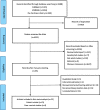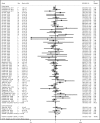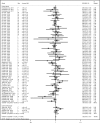Sleep duration and the risk of cancer: a systematic review and meta-analysis including dose-response relationship
- PMID: 30463535
- PMCID: PMC6249821
- DOI: 10.1186/s12885-018-5025-y
Sleep duration and the risk of cancer: a systematic review and meta-analysis including dose-response relationship
Abstract
Background: The effect of sleep duration on cancer risk remains controversial. We aimed to quantify the available evidence on this relationship using categorical and dose-response meta-analyses.
Methods: Population-based cohort studies and case-control studies with at least three categories of sleep duration were identified by searching PubMed, EMBASE, and the Cochrane Library database up to July 2017.
Results: Sixty-five studies from 25 articles were included, involving 1,550,524 participants and 86,201 cancer cases. The categorical meta-analysis revealed that neither short nor long sleep duration was associated with increased cancer risk (short: odds ratio [OR] = 1.01, 95% confidence intervals [CI] = 0.97-1.05; long: OR = 1.02, 95% CI = 0.97-1.07). Subgroup analysis revealed that short sleep duration was associated with cancer risk among Asians (OR = 1.36; 95% CI: 1.02-1.80) and long sleep duration significantly increased the risk of colorectal cancer (OR = 1.21; 95% CI: 1.08-1.34). The dose-response meta-analysis showed no significant relationship between sleep duration and cancer risk. When treated as two linear piecewise functions with a cut point of 7 h, similar nonsignificant associations were found (per 1-h reduction: OR = 1.02, 95% CI = 0.98-1.07; per 1-h increment: OR = 1.003, 95% CI = 0.97-1.03).
Conclusion: Categorical meta-analysis indicated that short sleep duration increased cancer risk in Asians and long sleep duration increased the risk of colorectal cancer, but these findings were not consistent in the dose-response meta-analysis. Long-term randomized controlled trials and well-designed prospective studies are needed to establish causality and to elucidate the mechanism underlying the association between sleep duration and cancer risk.
Keywords: Cancer incidence; Categorical meta-analysis; Dose–response meta-analysis; Sleep duration.
Conflict of interest statement
The authors declare that they have no competing interests.
Figures






References
Publication types
MeSH terms
Grants and funding
LinkOut - more resources
Full Text Sources
Molecular Biology Databases

